When it comes to dreaming big, for an author, the Booker Prize is about as big as you can dream. It is the leading literary award in the English-speaking world, awarded annually to the “best sustained work of fiction” published in the UK and Ireland, in the opinion of the judges. It is a transformational award in terms of an author’s career – winning brings recognition, reward (the winner receiving £50,000/€57,500) and a worldwide readership.
Since the Booker Prize’s inception in 1969, there have been six Irish authors who have won the award – a high percentage of winners, in fact, shining a light on Ireland’s literary prowess. Donegal man, Paul Lynch is the most recent recipient, being named the 2023 winner for his novel, Prophet Song. He follows authors Iris Murdoch, John Banville, Roddy Doyle, Anne Enright and Anna Burns.
Almost six months on from this life-changing moment, Paul Lynch recounts the moment that caused the biggest whirlwind in his career to date and how writing the book during the pandemic was poignant for many reasons.

“Winning the Booker Prize is the top of the mountain in literature. There’s nowhere else to go in the English language for a novel, this is it,” says Paul. “I’ve been doing events in front of people for so long that I don’t even think about it when I go up on a stage, but at the Booker Prize ceremony, I had a wobble. I left the room 20 minutes before the announcement. I didn’t know that it caused a mild panic as they were wondering where I was gone. But I needed a moment, I had been through a very bad year and a half and I just felt overwhelmed all of a sudden.”
Challenging times
A year before Paul won the award, he was diagnosed with cancer, which he has since been given the all-clear for. He wrote Prophet Song during the COVID-19 pandemic, something which seemed a little too familiar at times to his words on the page.
“I wrote the book in really tricky conditions because it was during lockdowns. It was a time when my second child was born also. I’m now separated and I also had long Covid, which was hugely challenging,” he says.
“I’d already written an ‘Emergency Powers Act’, a police state and curfew into the book before we started living through it. I remember looking out the window thinking, this is nuts, I’ve just written this. I just find all that very weird, that I had maybe somehow anticipated these things. That does not make me a prophet,” he laughs.
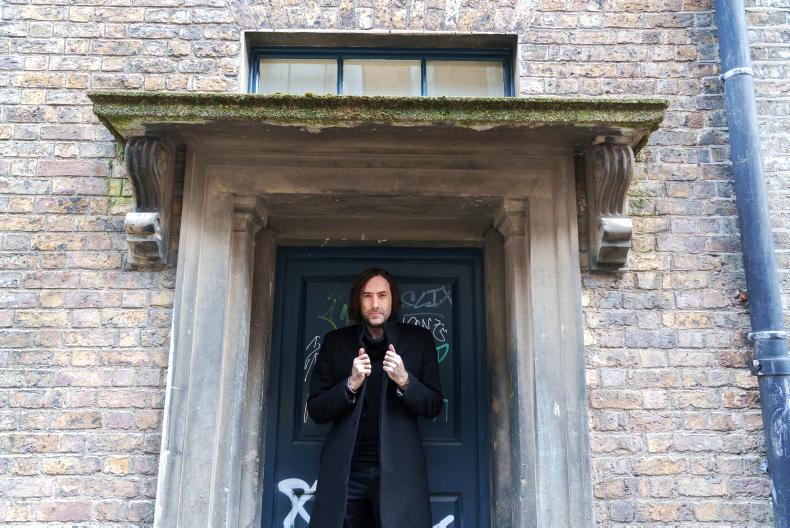
Paul Lynch.
Previous work
Prophet Song is a novel that depicts the struggles of the Stack family, with the protagonist Eilish Stack, a mother of four, trying to save her family as a version of present-day Ireland slips into totalitarianism. It is a book that is seen as crucial for the times we live in and reflects the upheaval and persecution that is happening the world over.
“When you’re writing a book, you don’t truly have a sense of what it is that you have on your hands. When you finish the novel, then it’s different,” says Paul.
“When I read the finished book, I thought two things to myself: one was that, and I said this in my acceptance speech at The Booker Prize Awards, I thought, ‘I’m doing my career here’. Because this book is so unrelenting and it’s confronting the reader in a very provocative way, that it’s a high-risk book. At the same time, I thought, I truly believe in this book. I think this book has major power. When I gave it to my agent, he was silent for a couple of weeks, which was excruciating. It turns out he was reading it twice. I think the first read overpowered him so he went back and read it again. He called me then and said, “this book is going to be a sensation.”
Prophet Song is Paul’s fifth novel after Beyond the Sea; Grace, which won the 2018 Kerry Group Irish Novel of the Year; The Black Snow; and Red Sky in Morning.
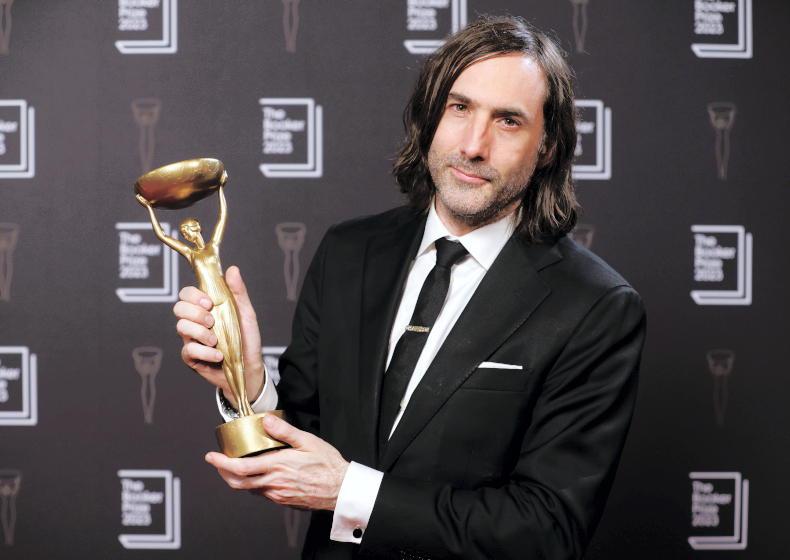
Booker Prize winner 2023, Paul Lynch, at the ceremony in November.
“I love Beyond the Sea because it’s the kind of book that I always wanted to write, which is a sort of European style, existential tale,” says Paul. “A book that goes back to writers like Conrad and his book, Heart of Darkness. Books that are trying to really probe down into what is it that were made of? I always dreamed about writing a book like that and I think I did.”
“My first three novels were historical fiction and the reason I was writing in that mode was because I was trying to get close to the mythic. I’m interested in ideas that are universal, ideas about what it means to be a human being, that do not change across time. Historical fiction allowed me to do that.”
Early background
Paul was born in Limerick, but his family moved to Donegal when he was nine months old, where he lived until he was 18 years of age, so he firmly considers himself a Donegal man.
“My father was at sea in the merchant navy. He was a radio officer. He came home and took a job with the Coast Guard. The choice of station, at the time, was either Valencia or Malin Head. We went to Malin Head. We lived there for my first five years and, even now, the sense of place is completely imprinted in my psyche. I can still hear the sound of the wind, the sense of space, and that feeling of the elements, of living right up against this very raw, western seaboard. Malin Head is a wild place to be.”
From an early age, Paul was a bookworm and found that he was consuming books at pace, but also with a vast diversity of topics. “I remember when I was about eight or nine years old, a teacher gave me The Prisoner of Zenda (1894 by Anthony Hope) to read. I’m sure it was abridged, but I just devoured it. That sort of mania around books took hold of me from that point on,” says Paul.
“I was fortunate to have people around me who thought it was a good idea that I read. My parents were feeding me books. When I was maybe 10 years old, I inherited a collection of first edition The Hardy Boys books from my uncle. I became completely obsessed. Years later, my mother told me that my teacher would regularly see me reading secretly under the desk during class, but he decided to let it go because he thought it was good. I was astonished by that.”
“Actually, I’ll tell you something else about school that nobody knows… I was actually temporarily kicked out of honours English on the Leaving Cert cycle. I didn’t like the teacher and I was being quite bold in class. But I was reinstated because some teachers quietly protested about it and my parents also got involved,” he laughs.
On writing
Following his love of the written word, Paul began his career writing in the Sunday Tribune as a sub-editor. He loved it as it allowed him to work with words but also to hide from people, admitting to being socially introverted.
“I just wanted to work with words. I wanted to roll up my sleeves and play with language all day long. I was too introverted to be a reporter. I didn’t have the social confidence to do that kind of work. But I could sit at the desk all day long, not talk to people and edit material and shape it. That work was perfect for me.”
“Over time, I became more senior in the paper and, later on, I became the chief film critic, but I had writer’s block. It was a fundamental lack of confidence in myself. I’m very open about this. I went to therapy in my 20s with this great therapist, and she, in a couple of months, unblocked me. That was the start. I started writing reviews for the newspaper very soon after that. I felt more confident. I started writing fiction when I was 30.”
“When I started writing books, I realised a couple of things: one was that you write to fail. That writing is actually failure. You’re always stumbling your way along the page. I just gave myself permission to fail better. The other thing was that all the work I had been doing and editing over the years had been me working towards being a fiction writer. All the skills I needed were there. I had control and tone and, suddenly at 30, I also had ideas. I thought, ‘okay, I know myself now and I have thoughts that I want to say about the world’ and so, suddenly, it flowed out of me.”
Recognition
With the Booker Prize firmly placed on his shelf and attached to his name, Paul has not only become recognised for this but has also become somewhat of a national hero, garnering attention from all corners of the country.
“It has definitely taken me aback. I get stopped all the time. It’s been marvellous. There is a sense of pride. John McGahern, Irish writer, once said that a writer’s duty is only to his sentences and not to the country that it comes from. But I do think that when you bring home a prize, like the Booker, to Ireland, there is a sense of, ‘I’m doing this as an Irish novelist’. It was really moving to see how everyone was affected by it, but then, books matter in this country.”
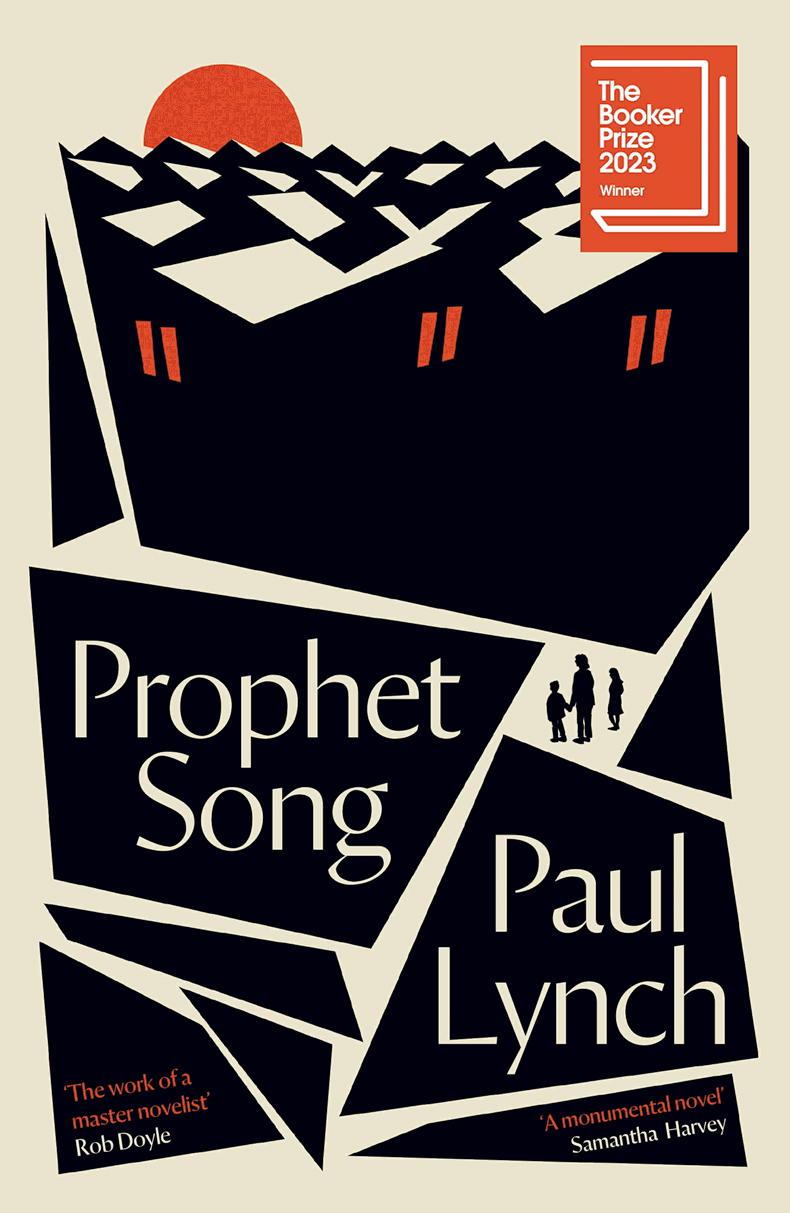
Prophet Song by Paul Lynch, the Booker Prize winning novel in 2023 by the Irish author.
• Booker Prize winning novel, Prophet Song by Paul Lynch, is published by Oneworld (€15.99)
When it comes to dreaming big, for an author, the Booker Prize is about as big as you can dream. It is the leading literary award in the English-speaking world, awarded annually to the “best sustained work of fiction” published in the UK and Ireland, in the opinion of the judges. It is a transformational award in terms of an author’s career – winning brings recognition, reward (the winner receiving £50,000/€57,500) and a worldwide readership.
Since the Booker Prize’s inception in 1969, there have been six Irish authors who have won the award – a high percentage of winners, in fact, shining a light on Ireland’s literary prowess. Donegal man, Paul Lynch is the most recent recipient, being named the 2023 winner for his novel, Prophet Song. He follows authors Iris Murdoch, John Banville, Roddy Doyle, Anne Enright and Anna Burns.
Almost six months on from this life-changing moment, Paul Lynch recounts the moment that caused the biggest whirlwind in his career to date and how writing the book during the pandemic was poignant for many reasons.

“Winning the Booker Prize is the top of the mountain in literature. There’s nowhere else to go in the English language for a novel, this is it,” says Paul. “I’ve been doing events in front of people for so long that I don’t even think about it when I go up on a stage, but at the Booker Prize ceremony, I had a wobble. I left the room 20 minutes before the announcement. I didn’t know that it caused a mild panic as they were wondering where I was gone. But I needed a moment, I had been through a very bad year and a half and I just felt overwhelmed all of a sudden.”
Challenging times
A year before Paul won the award, he was diagnosed with cancer, which he has since been given the all-clear for. He wrote Prophet Song during the COVID-19 pandemic, something which seemed a little too familiar at times to his words on the page.
“I wrote the book in really tricky conditions because it was during lockdowns. It was a time when my second child was born also. I’m now separated and I also had long Covid, which was hugely challenging,” he says.
“I’d already written an ‘Emergency Powers Act’, a police state and curfew into the book before we started living through it. I remember looking out the window thinking, this is nuts, I’ve just written this. I just find all that very weird, that I had maybe somehow anticipated these things. That does not make me a prophet,” he laughs.

Paul Lynch.
Previous work
Prophet Song is a novel that depicts the struggles of the Stack family, with the protagonist Eilish Stack, a mother of four, trying to save her family as a version of present-day Ireland slips into totalitarianism. It is a book that is seen as crucial for the times we live in and reflects the upheaval and persecution that is happening the world over.
“When you’re writing a book, you don’t truly have a sense of what it is that you have on your hands. When you finish the novel, then it’s different,” says Paul.
“When I read the finished book, I thought two things to myself: one was that, and I said this in my acceptance speech at The Booker Prize Awards, I thought, ‘I’m doing my career here’. Because this book is so unrelenting and it’s confronting the reader in a very provocative way, that it’s a high-risk book. At the same time, I thought, I truly believe in this book. I think this book has major power. When I gave it to my agent, he was silent for a couple of weeks, which was excruciating. It turns out he was reading it twice. I think the first read overpowered him so he went back and read it again. He called me then and said, “this book is going to be a sensation.”
Prophet Song is Paul’s fifth novel after Beyond the Sea; Grace, which won the 2018 Kerry Group Irish Novel of the Year; The Black Snow; and Red Sky in Morning.

Booker Prize winner 2023, Paul Lynch, at the ceremony in November.
“I love Beyond the Sea because it’s the kind of book that I always wanted to write, which is a sort of European style, existential tale,” says Paul. “A book that goes back to writers like Conrad and his book, Heart of Darkness. Books that are trying to really probe down into what is it that were made of? I always dreamed about writing a book like that and I think I did.”
“My first three novels were historical fiction and the reason I was writing in that mode was because I was trying to get close to the mythic. I’m interested in ideas that are universal, ideas about what it means to be a human being, that do not change across time. Historical fiction allowed me to do that.”
Early background
Paul was born in Limerick, but his family moved to Donegal when he was nine months old, where he lived until he was 18 years of age, so he firmly considers himself a Donegal man.
“My father was at sea in the merchant navy. He was a radio officer. He came home and took a job with the Coast Guard. The choice of station, at the time, was either Valencia or Malin Head. We went to Malin Head. We lived there for my first five years and, even now, the sense of place is completely imprinted in my psyche. I can still hear the sound of the wind, the sense of space, and that feeling of the elements, of living right up against this very raw, western seaboard. Malin Head is a wild place to be.”
From an early age, Paul was a bookworm and found that he was consuming books at pace, but also with a vast diversity of topics. “I remember when I was about eight or nine years old, a teacher gave me The Prisoner of Zenda (1894 by Anthony Hope) to read. I’m sure it was abridged, but I just devoured it. That sort of mania around books took hold of me from that point on,” says Paul.
“I was fortunate to have people around me who thought it was a good idea that I read. My parents were feeding me books. When I was maybe 10 years old, I inherited a collection of first edition The Hardy Boys books from my uncle. I became completely obsessed. Years later, my mother told me that my teacher would regularly see me reading secretly under the desk during class, but he decided to let it go because he thought it was good. I was astonished by that.”
“Actually, I’ll tell you something else about school that nobody knows… I was actually temporarily kicked out of honours English on the Leaving Cert cycle. I didn’t like the teacher and I was being quite bold in class. But I was reinstated because some teachers quietly protested about it and my parents also got involved,” he laughs.
On writing
Following his love of the written word, Paul began his career writing in the Sunday Tribune as a sub-editor. He loved it as it allowed him to work with words but also to hide from people, admitting to being socially introverted.
“I just wanted to work with words. I wanted to roll up my sleeves and play with language all day long. I was too introverted to be a reporter. I didn’t have the social confidence to do that kind of work. But I could sit at the desk all day long, not talk to people and edit material and shape it. That work was perfect for me.”
“Over time, I became more senior in the paper and, later on, I became the chief film critic, but I had writer’s block. It was a fundamental lack of confidence in myself. I’m very open about this. I went to therapy in my 20s with this great therapist, and she, in a couple of months, unblocked me. That was the start. I started writing reviews for the newspaper very soon after that. I felt more confident. I started writing fiction when I was 30.”
“When I started writing books, I realised a couple of things: one was that you write to fail. That writing is actually failure. You’re always stumbling your way along the page. I just gave myself permission to fail better. The other thing was that all the work I had been doing and editing over the years had been me working towards being a fiction writer. All the skills I needed were there. I had control and tone and, suddenly at 30, I also had ideas. I thought, ‘okay, I know myself now and I have thoughts that I want to say about the world’ and so, suddenly, it flowed out of me.”
Recognition
With the Booker Prize firmly placed on his shelf and attached to his name, Paul has not only become recognised for this but has also become somewhat of a national hero, garnering attention from all corners of the country.
“It has definitely taken me aback. I get stopped all the time. It’s been marvellous. There is a sense of pride. John McGahern, Irish writer, once said that a writer’s duty is only to his sentences and not to the country that it comes from. But I do think that when you bring home a prize, like the Booker, to Ireland, there is a sense of, ‘I’m doing this as an Irish novelist’. It was really moving to see how everyone was affected by it, but then, books matter in this country.”

Prophet Song by Paul Lynch, the Booker Prize winning novel in 2023 by the Irish author.
• Booker Prize winning novel, Prophet Song by Paul Lynch, is published by Oneworld (€15.99)









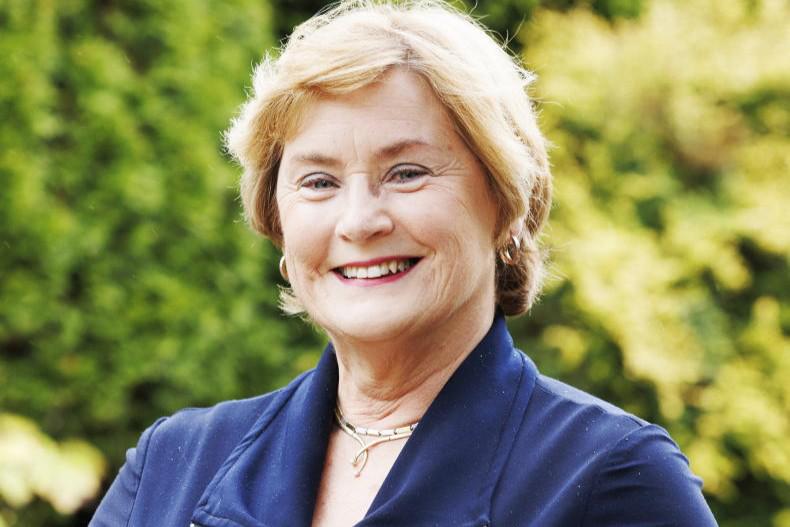


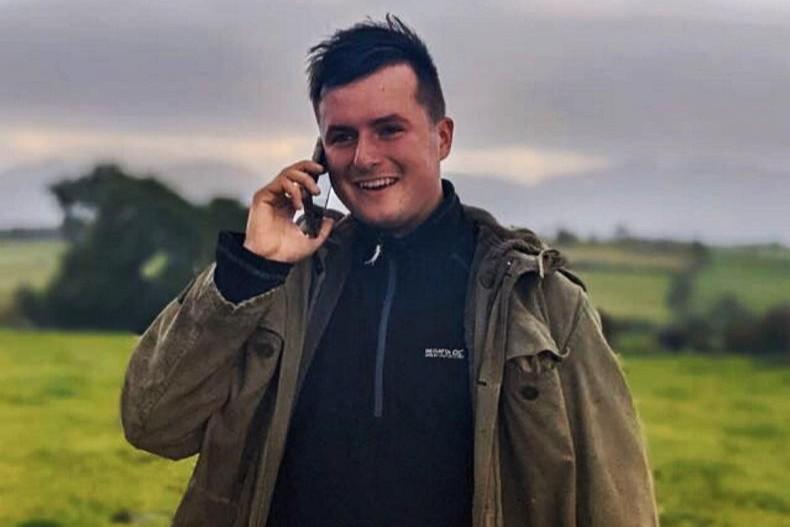
SHARING OPTIONS